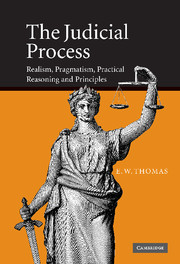Book contents
- Frontmatter
- Contents
- Preface
- 1 Introduction
- 2 Muddling along
- 3 The ‘curse’ of formalism
- 4 Legal fundamentalism
- 5 The idolatry of certainty
- 6 The piety of precedent
- 7 The foibles of precedent – a case study
- 8 There is no impersonal law
- 9 So, what is the law?
- 10 The constraints on the judiciary
- 11 Towards a new judicial methodology
- 12 Of realism and pragmatism
- 13 Of … practical reasoning and principles
- 14 Taking law seriously
- 15 A theory of ameliorative justice
- Subject index
- Authors index
7 - The foibles of precedent – a case study
Published online by Cambridge University Press: 15 July 2009
- Frontmatter
- Contents
- Preface
- 1 Introduction
- 2 Muddling along
- 3 The ‘curse’ of formalism
- 4 Legal fundamentalism
- 5 The idolatry of certainty
- 6 The piety of precedent
- 7 The foibles of precedent – a case study
- 8 There is no impersonal law
- 9 So, what is the law?
- 10 The constraints on the judiciary
- 11 Towards a new judicial methodology
- 12 Of realism and pragmatism
- 13 Of … practical reasoning and principles
- 14 Taking law seriously
- 15 A theory of ameliorative justice
- Subject index
- Authors index
Summary
Lewis v Attorney-General of Jamaica
In Lewis v Attorney-General of Jamaica, the Privy Council overruled five of its previous decisions in respect of three different issues. All but one of these decisions had been decided in the previous five years. Lewis v Attorney-General of Jamaica is, therefore, a suitable decision to discuss in the light of the points made, and the thesis advanced, in the previous chapter.
Consolidated appeals were brought before the Privy Council on behalf of six death row prisoners in Jamaica. Five other death row prisoners in Belize, and the Attorney-General of Trinidad and the Bahamas, were given leave to intervene.
The first of the three issues was whether the Jamaican Privy Council, which is obliged by section 91 of the Constitution to advise the Governor-General on the prerogative of mercy, is required to disclose to the prisoner the information it has received pursuant to that section and to hear representations from the prisoner. These questions had been decided in the negative in Reckley v Minister of Public Safety and Immigration (No. 2), when the Board followed and applied its previous decision in de Freitas v Benny. The second issue was whether it would be lawful to execute a sentence of death while a petition that the prisoner was lawfully permitted to make to the Inter-American Commission on Human Rights (IACHR) of the Organization of American States and the United Nations Human Rights Committee (UNHRC) remained under consideration.
- Type
- Chapter
- Information
- The Judicial ProcessRealism, Pragmatism, Practical Reasoning and Principles, pp. 164 - 183Publisher: Cambridge University PressPrint publication year: 2005

